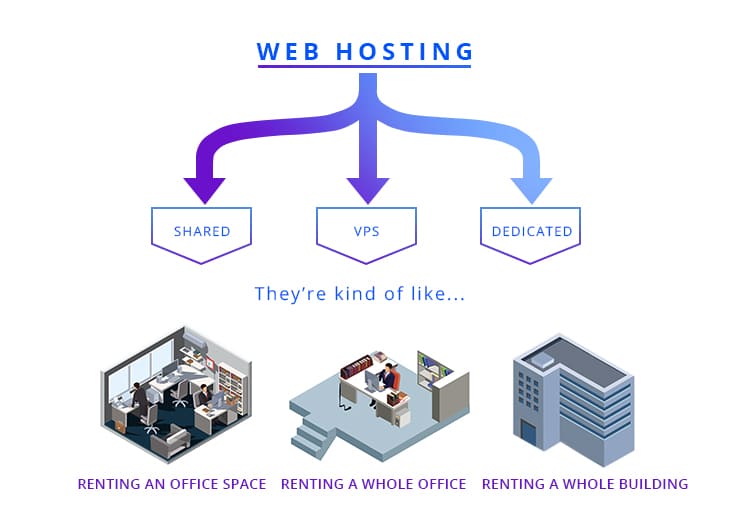Expert Tips: How to Choose Hosting for CS-Cart
Hello!
Our friends from Simtech Development shared another useful article by their hosting and security engineer Gleb Goncharov. This time Gleb tells about different types of hostings and about how to choose the right one for CS-Cart.
 |
Gleb Goncharov, the head of the DevOps department at Simtech Development, a server guru, a Mortal Kombat jedi, and all-around nice guy. |
Choosing a hosting is like searching for an office space—how to decide between a workstation in an open space, an office in a business centre and a rental building? Or should you even build your own one? Or is it just for big players like Facebook or Google?
There are various types of web hosting services available to host your website. The choice depends on your needs and budget. To get a better understanding of the differences between them, imagine that you’re looking for an office space.
Types of a Web Hosting
Shared hosting can be compared to a workstation in a noisy open space office. You have a desk, computer with Internet connection, stationery, and file folder holding papers. You share the room with other co-workers—you use a shared printer, kitchen, and WC. You cannot install a whiteboard, or do makeovers, or change the desk.
This type of hosting involves using shared CPU time, disk space, and network. It makes you dependent on your neighbours—heavy load on other websites will affect performance of yours. Shared hosting is the cheapest but unreliable way of launching commercial projects. It is more suitable for one-page websites than online stores.
A virtual private server is a better option for mid-sized businesses. It’s like renting an office in a business center. You are less dependent on your neighbours and can do makeovers the way you wish. The owner offers a space with electricity, water supply, and Internet. You organize your workstation on your own—you get a desk, a computer, a printer, and all the stationery.
Virtual private servers (VPS/VDS) better isolate users from each other. Each one gets enough CPU, RAM, and can perform necessary operations on the disk and network. It’s an affordable and reliable way of hosting mid-sized commercial projects. But keep in mind that there are several virtual servers hosted on the same hardware, therefore the higher the load on the server is, the slower the performance of your virtual machine is.
The most reliable type of hosting is a dedicated server. It can be compared to renting a whole building. Remember that this option is affordable for large companies who value reliability and high performance, as it’s quite costly to buy or rent a server. Sometimes it’s not worth paying extra money for what you won’t simply use. Keep this in mind while planning your expenses.

Where to Host a Server?
Choosing a hosting location is similar to searching for a location for an office. First of all, the place should be convenient for your users—it should be easy and quick to reach. Therefore, it is important to find a hosting provider in the region where most customers are located. For example, if most of your customers are from Australia, you shouldn’t consider servers in Europe or the USA. Find a local provider.
The closer the server is, the faster the site will load. And fast sites sell more than slow ones. The study by Walmart showed that every second of improvement in their website loading time would increase conversion by 2%.
If you have customers from different regions, check the visitors’ geographic location in Google Analytics or Yandex.Metrica. Proximity to your target customers is the key factor—locate your server where most of your orders come from.
How to Choose a Hosting Provider?
So, you found a list of hosting providers. But which one should you go with? To choose the perfect one for you, pay attention to the SLA and uptime guarantees. SLA is a contract that contains obligations of the hosting provider for provision of quality services. Hosting providers usually define uptime and recovery time in case of server failure in their SLA. The more 9s you see in the uptime score, the more reliable the hosting is.
Read reviews on tech support. Your website should have a reliable cover. To be sure that during a vacation or a trip to the countryside your site will be up and running, you should be backed up by a team of capable professionals.
How to Configure a Server?
Configuring a server is like doing a makeover in a new office. You can do that in several ways.
-
- The first option is to do everything on your own. It’s cheap, but usually does not give the quickest and high-quality result.
-
- The second option is to get a server with a control panel. It can be compared to a turn-key office space. It would be a rental space in a move-in condition, where you cannot change anything. It’s a good option if you want to manage the server via web interface yourself. Tech issues will be fixed by a hosting provider. But the truth is that a hosting provider often does not know how to help you out if you have troubles with the site operation. The tech support would shrug their shoulders and ask you to contact developers. Moreover, servers with control panels ignore the specifics of launched projects and, as a result, the site may perform slower.
- The third option is to leave it to professionals. It’s like hiring a team of builders to do a makeover in your office. Our team of engineers will complete this task exactly the way you want with the claimed speed and quality. We guarantee the result and always meet the deadline. Unlike most hosts, we monitor not only the server health, but also the store performance. We are a team of experienced engineers with AWS certification. We will be aware if something goes wrong and will be notified of malfunctions even if they occur at night. We do backups to ensure that no data is lost. The sites on our hosting perform quicker than the sites of your competitors.
Got interested in the professional help? Learn more about our Amazon Cloud Hosting services and ask your questions at [email protected].
On the CS-Cart blog we post company news, release posts, and useful articles from eCommerce experts. Follow CS-art on Facebook and Twitter so as not to miss new publications.
Yan Anderson is the Head of Content Marketing at CS-Cart with over 10 years of experience in the eCommerce industry. He's passionate about explaining complicated things in simple terms. Yan has expertise in building, running and growing eCommerce marketplaces. He loves to educate people about best practices, new technologies, and trends in the global eCommerce industry.

